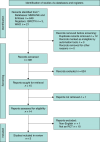Operative versus conservative management for inguinal hernia: a methodology scoping review of randomized controlled trials
- PMID: 39316636
- PMCID: PMC11421466
- DOI: 10.1093/bjsopen/zrae116
Operative versus conservative management for inguinal hernia: a methodology scoping review of randomized controlled trials
Erratum in
-
Correction to: Operative versus conservative management for inguinal hernia: a methodology scoping review of randomized controlled trials.BJS Open. 2024 Dec 30;9(1):zrae164. doi: 10.1093/bjsopen/zrae164. BJS Open. 2024. PMID: 39854629 Free PMC article. No abstract available.
Abstract
Introduction: There is a lack of consensus on the management of inguinal hernia with limited symptoms. To address this issue a systematic review of existing randomized clinical trials (RCTs) was performed to critically appraise all existing data on asymptomatic hernia management, focusing on generalizability.
Methods: A scoping review to identify all RCTs comparing surgical and conservative management of patients with inguinal hernias was undertaken. Medline, Embase, Cochrane and ClinicalTrials.gov databases were searched. Data collected included study characteristics and definitions of population, intervention/comparator, and outcomes; and limitations of each study were also extracted. The quality and generalizability of included RCTs were evaluated using Cochrane's ROB-2 and the PRECIS-2 tool, respectively.
Results: Searches returned 661 papers; 14 full-text papers were assessed and three RCTs were identified. All RCTs included only male patients with a mean age above 55 years. All RCTs included asymptomatic patients and two included those with minimal symptoms. Different definitions for 'minimally symptomatic' were used in RCTs and none provided details of what was meant by conservative treatment. Follow-up periods varied between studies (1, 2, 3 years). All RCTs had an overall high risk of bias. According to PRECIS-2, two RCTs were classified as pragmatic, and one was equally pragmatic and explanatory.
Discussion: This systematic review highlights a high risk of bias but a good generalizability of the findings from the RCTs conducted on minimally symptomatic inguinal hernia patients. To improve the guidelines for the management of this group of patients, more generalizable data are needed.
© The Author(s) 2024. Published by Oxford University Press on behalf of BJS Foundation Ltd.
Figures


Similar articles
-
International guidelines for groin hernia management.Hernia. 2018 Feb;22(1):1-165. doi: 10.1007/s10029-017-1668-x. Epub 2018 Jan 12. Hernia. 2018. PMID: 29330835 Free PMC article.
-
Antibiotic prophylaxis for prevention of postoperative wound infection in adults undergoing open elective inguinal or femoral hernia repair.Cochrane Database Syst Rev. 2020 Apr 21;4(4):CD003769. doi: 10.1002/14651858.CD003769.pub5. Cochrane Database Syst Rev. 2020. PMID: 32315460 Free PMC article.
-
Desarda's technique versus Lichtenstein technique for the treatment of primary inguinal hernia: a systematic review and meta-analysis of randomized controlled trials.Hernia. 2018 Jun;22(3):385-395. doi: 10.1007/s10029-017-1666-z. Epub 2017 Sep 9. Hernia. 2018. PMID: 28889330
-
Laparoscopic versus open pediatric inguinal hernia repair: state-of-the-art comparison and future perspectives from a meta-analysis.Surg Endosc. 2019 Oct;33(10):3177-3191. doi: 10.1007/s00464-019-06960-2. Epub 2019 Jul 17. Surg Endosc. 2019. PMID: 31317333 Free PMC article.
-
No evidence for fixation of mesh in laparoscopic transabdominal preperitoneal (TAPP) inguinal hernia repair: a systematic review and meta-analysis of randomized controlled trials.Surg Endosc. 2023 Nov;37(11):8291-8300. doi: 10.1007/s00464-023-10237-0. Epub 2023 Sep 6. Surg Endosc. 2023. PMID: 37674053 Free PMC article.
References
-
- Cheek CM. Inguinal hernia repair: incidence of elective and emergency surgery, readmission and mortality. Int J Epidemiol 1997;26:459–461 - PubMed
-
- Mizrahi H, Parker MC. Management of asymptomatic inguinal hernia: a systematic review of the evidence. Arch Surg 2012;147:277–281 - PubMed
-
- Gallegos NC, Dawson J, Jarvis M, Hobsley M. Risk of strangulation in groin hernias. Br J Surg 1991;78:1171–1173 - PubMed
-
- Montes A, Roca G, Sabate S et al. Genetic and clinical factors associated with chronic postsurgical pain after hernia repair, hysterectomy, and thoracotomy: a two-year multicenter cohort study. Anesthesiology 2015;122:1123–1141 - PubMed
-
- Bay-Nielsen M, Kehlet H, Strand L et al. Quality assessment of 26,304 herniorrhaphies in Denmark: a prospective nationwide study. Lancet 2001;358:1124–1128 - PubMed
Publication types
MeSH terms
Grants and funding
LinkOut - more resources
Full Text Sources

